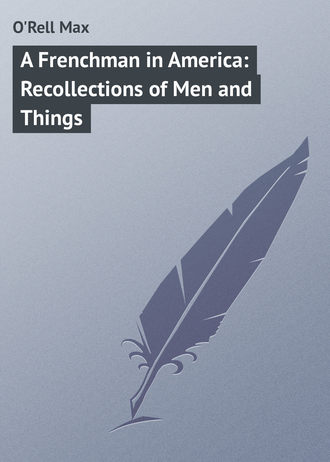 полная версия
полная версияA Frenchman in America: Recollections of Men and Things
The little encounter at Whitewater was only one more illustration of the strange fact that the Anglo-Saxon, who is so good in his own country, so constant in his attendance at church, is seldom to be seen in a sacred edifice abroad, unless, indeed, he has been led there by Baedeker.
And last night, at Whitewater, I went to bed pleased with myself, like a man who has fought for his country.
…When I am in France, I often bore my friends with advice, and find, as usual, that advice is a luxurious gift thoroughly enjoyed by the one who gives it.
“You don’t know how to do these things,” I say to them; “in England or in America, they are much more intelligent; they do like this and like that.” And my friends generally advise me to return to England or America, where things are so beautifully managed.
But, when I am out of France, the old Frenchman is all there, and if you pitch into my mother country, I stand up ready to fight at a minute’s notice.
CHAPTER XLII
The Origin of American Humor and Its Characteristics – The Sacred and the Profane – The Germans and American Humor – My Corpse Would “Draw,” in My Impresario’s Opinion Madison, Wis., April 22.Have been lecturing during the past fortnight in about twelve places, few of which possessed any interest whatever. One of them, however – Cincinnati – I was glad to see again.
This town of Madison is the only one that has really struck me as being beautiful. From the hills the scenery is perfectly lovely, with its wooded slopes and lakes. Through the kindness of Governor Hoard, I have had a comprehensive survey of the neighborhood; for he has driven me in his carriage to all the prettiest spots, delighting me all the while with his conversation. He is one of those Americans whom you may often meet if you have a little luck: witty, humorous, hospitable, kind-hearted, the very personification of unaffected good-fellowship.
The conversation turned on humor.
I have always wondered what the origin of American humor can be; where is or was the fountain-head. You certainly find humor in England among the cultured classes, but the class of English people who emigrate cannot have imported much humor into America. Surely Germany and Scandinavia cannot have contributed to the fund, either. The Scotch have dry, quiet, pawky, unconscious humor; but their influence can hardly have been great enough to implant their quaint native “wut” in American soil. Again, the Irish bull is droll, but scarcely humorous. The Italians, the Hungarians, have never yet, that I am aware of, been suspected of even latent humor.
What then, can be the origin of American humor, as we know it, with its naïve philosophy, its mixture of the sacred and the profane, its exaggeration and that preposterousness which so completely staggers the foreigner, the French and the German especially?
The mixing of sacred with profane matter, no doubt, originated with the Puritans themselves, and is only an outcome of the cheek-by-jowl, next-door-neighbor fashion of addressing the Higher Powers, which is so common in the Scotch. Many of us have heard of the Scotch minister, whom his zeal for the welfare of missionaries moved to address Heaven in the following manner: “We commend to thy care those missionaries whose lives are in danger in the Fiji Islands … which, Thou knowest, are situated in the Pacific Ocean.” And he is not far removed in our minds from the New England pastor, who preached on the well-known text of St. Paul, and having read: “All things are possible to me,” took a five-dollar bill out of his pocket, and placing it on the edge of the pulpit, said: “No, Paul, that is going too far. I bet you five dollars that you can’t – ” But continuing the reading of the text: “Through Christ who strengtheneth me,” exclaimed, “Ah, that’s a very different matter!” and put back the five-dollar bill in his pocket.
This kind of amalgamation of the sacred and profane is constantly confronting one in American soil, and has a firm foothold in American humor.
Colonel Elliott F. Shepard, proprietor of the New York Mail and Express, every morning sends to the editor a fresh text from the Bible for publication at the top of the editorials. One day that text was received, but somehow got lost, and by noon was still unfound. I was told that “you should have heard the compositors’ room ring with: ‘Where can that d – d text be?’” Finally the text was wired and duly inserted. These men, however, did not intend any religious disrespect. Such a thing was probably as far from their minds as it was from the minds of the Puritan preachers of old. There are men who swear, as others pray, without meaning anything. One is a bad habit, the other a good one.
…All that naïve philosophy, with which America abounds, must, I fancy, be the outcome of hardship endured by the pioneers of former days, and by the Westerner of our own times.
The element of exaggeration, which is so characteristic of American humor, may be explained by the rapid success of the Americans and the immensity of the continent which they inhabit. Everything is on a grand scale, or suggests hugeness. Then negro humor is mainly exaggeration, and has no doubt added its quota to the compound which, as I said just now, completely staggers certain foreigners.
Governor Hoard was telling me to-day that a German was inclined to be offended with him for saying that the Germans, as a rule, were unable to see through an American joke, and he invited Governor Hoard to try the effect of one upon him. The governor, thereupon told him the story of the tree, “out West,” which was so high that it took two men to see to the top. One of them saw as far as he could, then the second started from the place where the first stopped seeing, and went on. The recital did not raise the ghost of a smile, and Governor Hoard then said to the German: “Well, you see, the joke is lost upon you; you can’t see American humor.”
“Oh, but,” said the German, “that is not humor, that’s a tamnt lie!”
And he is still convinced that he can see through an American joke.
… Grand Rapids, April 24.Have had to-day a lovely, sublime example of that preposterousness which so often characterizes American humor.
Arrived here this morning from Chicago. At noon, the Grand Rapidite who was “bossing the show” called upon me at the Morton House, and kindly inquired whether there was anything he could do for me. Before leaving, he said: “While I am here, I may as well give you the check for to-night’s lecture.”
“Just as you please,” I said; “but don’t you call that risky?”
“What do you mean?”
“Well, I may die before the evening.”
“Oh, that’s all right,” he interrupted. “I’ll exhibit your corpse; I guess there will be just as much money in it!”
…Grand Rapids is noted for its furniture manufactories. A draughtsman, who is employed to design artistic things for the largest of these manufactories, kindly showed me over the premises of his employers. I was not very surprised to hear that when the various retail houses come to make their yearly selections, they will not look at any models of the previous season, so great is the rage for novelties in every branch of industry in this novelty-loving America.
No sinecure, that draughtsman’s position, I can tell you.
Over in Europe, furniture is reckoned by periods. Here it is an affair of seasons.
Very funny to have to order a new sideboard or wardrobe, “to be sent home without delay” for fear of its being out of date.
CHAPTER XLIII
Good-by to America – Not “Adieu,” but “Au Revoir” – On Board the “Teutonic” – Home Again New York, April 26.The last two days have vanished rapidly in paying calls.
This morning my impresario gave me a farewell breakfast at the Everett House. Edmund Clarence Stedman was there; Mark Twain, George Kennan, General Horace Porter, General Lloyd Bryce, Richard Watson Gilder, and many others sat at table, and joined in wishing me bon voyage.
Good-by, my dear American friends, I shall carry away sweet recollections of you, and whether I am re-invited in your country or not, I will come again.
… April 27.The saloon on board the Teutonic is a mass of floral offerings sent by friends to the passengers. Two huge beautiful baskets of lilies and roses are mine.
The whistle is heard for the third time. The hands are pressed and the faces kissed, and all those who are not passengers leave the boat and go and take up position on the wharf to wave their handkerchiefs until the steamer is out of sight. A great many among the dense crowd are friendly faces familiar to me.
The huge construction is set in motion, and gently and smoothly glides from the docks to the Hudson River. The sun is shining, the weather glorious.
The faces on land get less and less distinct. For the last time I wave my hat.
Hallo, what is the matter with me? Upon my word, I believe I am sad. I go to the library, and, like a child, seize a dozen sheets of note paper on which I write: “Good-by.” I will send them to New York from Sandy Hook.
The Teutonic is behaving beautifully. We pass Sandy Hook. The sea is perfectly calm. Then I think of my dear ones at home, and the happiest thoughts take the place of my feelings of regret at leaving my friends.
My impresario, Major J. B. Pond, shares a beautiful, well-lighted, airy cabin with me. He is coming to England to engage Mr. Henry M. Stanley for a lecture tour in America next season.
The company on board is large and choice. In the steerage a few disappointed American statesmen return to Europe.
Oh! that Teutonic! can any one imagine anything more grand, more luxurious? She is going at the rate of 450 miles a day. In about five days we shall be at Queenstown.
… Liverpool, May 4.My most humble apologies are due to the Atlantic for libeling that ocean at the beginning of this book. For the last six days the sea has been perfectly calm, and the trip has been one of pleasure the whole time. Here is another crowd on the landing-stage at Liverpool.
And now, dear reader, excuse me if I leave you. You were present at the friendly farewell handshakings on the New York side; but, on this Liverpool quay, I see a face that I have not looked upon for five months, and having a great deal to say to the owner of it, I will politely bow you out first.
1
J. B. O’Reilly died in 1890.
2
Destroyed by fire three days after I left Toronto.
3
Very strange, that church with its stalls, galleries, and boxes – a perfect theater. From the platform it was interesting to watch the immense throng, packing the place from floor to ceiling, in front, on the sides, behind, everywhere.
4
A fee of ten dollars entitles a student to the privileges of permanent membership in the University.







